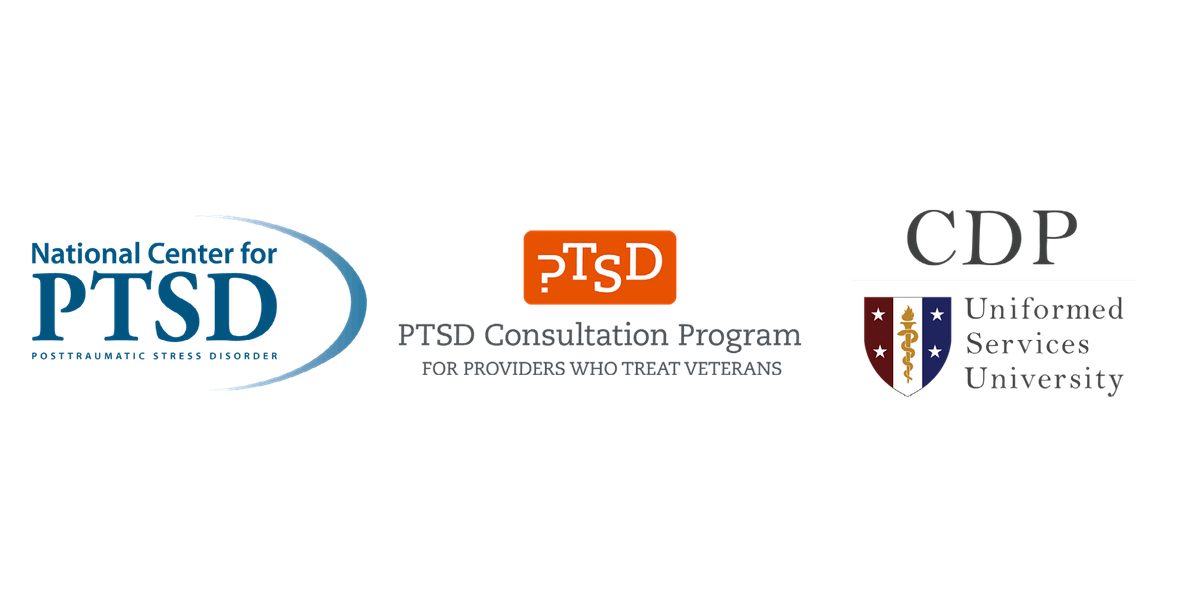
About this Event
Training on Assessment of PTSD and Suicide Risk Management in Veterans
This training is funded by the PTSD Consultation Program at VA’s National Center for PTSD and presented in collaboration with VA’s Suicide Risk Management Consultation Program and the Center for Deployment Psychology.
Cultural competence is an ethical and clinical imperative for effective clinical practice. Cultural competence for clinicians working with Veterans and Service members includes developing familiarity with unique aspects of military culture that impact clinical care as well as common clinical issues faced by these populations. This two-day workshop aims to introduce participants to military culture and help them develop skills in assessing for two important clinical issues: post-traumatic stress disorder (PTSD) and suicide risk.
Day One
An overview of military culture will be provided including basics about its history, organizational structure, core values, branches of the service, mission and operations, as well as the differences between the active and reserve components. Participants acquire greater competency in working with Service members and Veterans by learning military culture and terminology, and by discussing how aspects of the military culture impact behaviors and perspectives. The remainder of day one will review a method for screening, assessment, and treatment outcome monitoring of Posttraumatic Stress Disorder (PTSD) centered on the use of the PTSD Checklist for DSM-5 (PCL-5). Participants will be introduced to VA/DOD best practices for diagnosing military-related PTSD including screening for trauma-related disorders, obtaining thorough military and trauma histories, conducting a semi-structured diagnostic interview, and using self-report measures to track treatment outcome. Interactive exercises and video demonstrations will be used to help develop participants’ PTSD assessment skills.
Day Two
Veteran suicide remains a significant public health concern, with those diagnosed with PTSD at potentially elevated risk. Clinicians with the VA Suicide Risk Management Consultation Program will review risk factors and discuss empirically-supported best practices for suicide assessment, prevention, and intervention with Veterans, including lethal means safety counseling and collaborative safety planning.
Target Audience: For licensed behavioral health providers who treat Veterans. Non-VA licensed mental health providers who regularly treat U.S. Veterans or those who intend to treat U.S. Veterans can apply.
Learning Objectives:
Attendees will be able to:
- Characterize the structure and major components of the United States military.
- Analyze common characteristics of the military population and how they compare to the general population.
- Substantiate the importance of a distinct culture to the military.
- Appraise elements of the military experience and lifestyle that are integral to military culture.
- Apply the VA/DOD Guidelines for the Assessment of Trauma and PTSD.
- Discriminate between symptoms of PTSD and other disorders based on the DSM-5.
- Facilitate the screening, diagnostic assessment, and tracking of treatment outcomes in PTSD patients using the PTSD Checklist for DSM-5 (PCL-5).
- Communicate results of diagnostic assessments as well as treatment outcome measures to clients to facilitate effective treatment.
- Describe suicide risk identification methods, including identifying warning signs, predictive analytics, and screening.
- Learn how to conduct a comprehensive suicide clinical risk assessment by reviewing overarching goals of the assessment, suicidal ideation, history of suicide, recognizing warning signs, and identifying risk and protective factors for suicide.
- Understand how to utilize results of a suicide clinical risk assessment to complete a suicide risk formulation and recommendations for documentation of risk.
- Describe suicide risk stratification using patient examples to understand the differences between acute versus chronic suicide risk and descriptors for low, intermediate, and high risk status.
- Learn the purpose and principles underlying lethal means safety counseling as a best practice for suicide risk management.
- Describe specific methods and recommendations to approach lethal means safety counseling for US Veterans and firearms, medications, and other environmental risks.
- Identify the purpose of and steps needed to collaboratively develop a safety plan.
- Review strategies to enhance the use of a safety plan in order to mitigate suicide risk.
Application Information:
Applications can be completed through the Eventbrite system. All initial applicants will be waitlisted until the application is vetted through the CDP/VA Project Managers. Applicants will be notified by email of the decision within approximately two weeks of the application.
Cost/Refunds: Zero cost, no refund policy
Special Accommodations:
If you require special accommodations due to a disability, please contact Micah Norgard at [email protected] 2 weeks prior to the training so that we may provide you with appropriate service.
Presenters
Kevin Holloway, Ph.D. is a licensed clinical psychologist working as the Director, Training and Education at the Center for Deployment Psychology (CDP) at the Uniformed Services University of the Health Sciences in Bethesda, Maryland. In this capacity, he leads a team of subject matter experts and support staff to develop and present workshops across the world to military and civilian audiences on topics in deployment of behavioral health and evidence-based therapies for Posttraumatic Stress Disorder (PTSD). Additionally, he leads a team of mental health subject matter experts and technology experts to develop and disseminate technology solutions to improve access to and quality of professional training.
Abigail Angkaw, Ph.D., is a clinical psychologist and Section Chief overseeing a unit of community-based outpatient mental health clinics at the VA San Diego, PTSD Program Director at the VA San Diego, and an Associate Clinical Professor at the University of California, San Diego. Dr. Angkaw specializes in questions related to treatment, assessment, and clinic administration, including Prolonged Exposure (PE), Cognitive Processing Therapy (CPT), Clinician Administered PTSD Scale (CAPS-5), measurement-based care, motivation and engagement, and program improvement. Dr. Angkaw is a national PE consultant and a regional mentor in the VA PTSD Mentoring Program. Her primary research interests include PTSD and co-occurring conditions as well as improving the delivery of mental health treatment. As a VA provider and coming from a military family, Dr. Angkaw is personally invested in helping providers through complex clinical and administrative challenges to provide high quality care for Veterans with PTSD. Dr. Angkaw received her PhD from the University of Cincinnati. She completed her predoctoral internship in PTSD and comorbid substance use disorders and her postdoctoral fellowship in combat PTSD research at the University of California, San Diego/VA San Diego.
Hal S. Wortzel, M.D., is a forensic neuropsychiatrist at the Rocky Mountain MIRECC, where he serves as Director of Neuropsychiatric Consultation Services and Co-director for the National Suicide Risk Management Consultation Program. He is an Associate Professor of Psychiatry, Neurology and Physical Medicine & Rehabilitation at of the University of Colorado, and serves as the Michael K. Cooper Professor of Neurocognitive Disease, and as Faculty for the Program in Forensic Psychiatry. Dr. Wortzel maintains a private practice in Forensic Neuropsychiatry & Behavioral Neurology, and has consulted on numerous criminal and civil cases. Areas of research/scholarship interest include suicide risk management, aggression and suicide in the context of PTSD and TBI, brain injury litigation, and the application of emerging neuroscientific tools to the legal arena.
Kaily Clark, Psy.D., is a licensed Psychologist in the state of Colorado and has been serving our Nation’s Veterans through the Veteran’s Health Administration (VHA) since October 2012. She currently serves as part of the Clinical Core at the Rocky Mountain MIRECC for suicide prevention (MIRECC), where Dr. Clark works as part of the National Suicide Risk Management Consultation Program, REACH VET National Implementation Team, and the Local Suicide Risk Consultation Program at Rocky Mountain Regional VA Medical Center (RMR). She also provides evidenced-based practices for Veterans with various clinical presentations, including PTSD, as well as is on the Psychology Pre-Doctoral Training Committee. She serves on the AVAPL Newsletter team and is part of the VAPLC conference planning committee. Prior to her joining the MIRECC, Dr. Clark served as a Suicide Prevention Coordinator (SPC) and the Veterans Integration to Academic Leadership (VITAL) Program Coordinator, as well as the National VITAL Clinical Lead. She also has a private practice in Denver.
Megan Harvey, Ph.D., received her PhD in Clinical Psychology at the University of Cincinnati. She has held multiple positions within VA over the past 13+ years, including Local Recovery Coordinator, Local Evidence-Based Psychotherapy Coordinator, and Section Chief of Outpatient Services at the VA Eastern Colorado Health Care System. In 2018, Dr. Harvey joined the Rocky Mountain MIRECC for Veteran Suicide Prevention where she serves in the role of Program Evaluator for the Suicide Risk Management Consultation Program, is on the technical assistance team for the national Suicide Risk Identification Strategy and is a consultant for the Advanced Training in the Safety Planning Intervention (ASPI). Dr. Harvey’s interests include evidence-based interventions that promote recovery and mitigate suicide risk as well as program evaluation. She believes strongly in the mission of VHA and is honored to be contributing to Veteran services.
Ryan Holliday, Ph.D. is a Clinical Research Psychologist at the Rocky Mountain Mental Illness Research, Education and Clinical Center for Veteran Suicide Prevention and Assistant Professor at the University of Colorado Anschutz Medical Campus. His clinical and research interest focus upon understanding the intersection of trauma, psychosocial stressors (such as homelessness and justice involvement), and mental health. He is further interested in translating these findings into evidence-based practice.
Continuing Education
Pending
Event Venue
Online
USD 0.00
